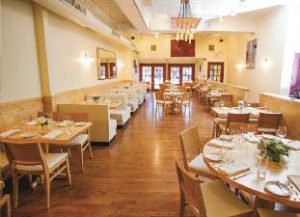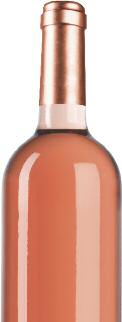Amuse
39 Elm Street, Westfield. Phone: 908.317.2640
Open for lunch Monday through Saturday from noon to 3 p.m. and Sundays for brunch from 11 a.m. to 3 p.m. Dinner, Monday through Thursday from 5 to 9 p.m., Friday and Saturday from 5 to 10 p.m. and Sunday from 5 to 8 p.m. BYOB.
Dress ranges from smart casual to festive. Prices: Soups and appetizers: $8 to $24. Entrees: $20 to $42. Desserts: $8. Major credit cards accepted.
Roasted bone marrow doesn’t need to shout. Its slithery texture, its unabashed tout of fat, its sturdy boat of a bone as conduit is so dominant a presence on a plate and on a menu that, without a word spoken, “French bistro” is conveyed.
Amuse, a spanking new French bistro in downtown Westfield, has bone marrow on the list of starters on its menu and it pops out at diners. Even before you see foie gras, steak tartare, escargot and frisee, your eyes light on “roasted bone marrow (with) sea salt, red onion marmalade, toast.” It’s so proper, it’s so right.
It’s also not surprising, for Amuse is the down-to-earth confection of Chez Catherine veteran C.J. Reycraft. A casual counterpart to the formality of Westfield’s longtime French fine-dining fortress, Amuse is new-school bistro, cheerfully decked in blond wood tables and chairs, with a handful of booths lining a rear wall and a modern “chandelier” that serves as a playful spoof to dripping candelabra.

Photo credit: Manny Carabel/MTC Photography
Amuse is Reycraft’s personal statement, a way of saying “bon appetit” without sounding haughty. It’s French bistro with an American look—clean-cut white tableware and linens, paned doors that serve as windows opening out onto the street, artwork in small doses. It’s a look that’s spare and calm, no frills, no ruffles, no fuss.
The food doesn’t appear fussed over, but it is carefully prepared. That bone marrow, stately and imposing with a pair of bones pitched in a cross formation on a stark white plate, comes with a riveting red onion marmalade that, rich and succulent as it is, actually serves to tame the silky marrow. Slather both atop the toast, then sprinkle with sea salt and understand why classics come to be: Some things are just too delicious to go out of style.
The frisee salad, topped by a perfectly poached duck egg, smoky-meaty lardons and crisp croutons, was spot-on. Poke open the yolk of the egg to let it ooze atop the bitter greens and lardons, then toss the lot into the Champagne vinaigrette. Super-size that salad and call it lunch. Or a post-theater midnight supper.
Reycraft’s foie gras is seared and served with brioche and a vanilla-licked pear compote that didn’t even approach sweet. The pear, just shy of ripe, was astringent enough to dial down the inherent hyper-richness of the fattened liver, and a flash of almonds brought crunch to every bite. Texture, in the right places and in the right doses, is something a smart chef understands.
Cashews brought that same touch to the mild ricotta-stuffed ravioli dressed in brown butter. The happy surprise here was a hint of tart-sweetness coming from a quick spray of chopped cranberries. I love dining out for such ah-ha moments: Why not just a touch, the barest touch of dried fruit with that pocket of cheese-filled pasta? It made the dish taste finished, complete and, ultimately, special.
A dining companion was tickled to find beech mushrooms perched on the plate of duck confit and butternut squash puree with a sprinkling of dried cherries. She loved seeing these creamy-tasting wild mushrooms she’s acquainted with from her native Japanese cookery, while I was just as happy to find them a yin to the yang of the preserved duck leg and thigh’s crackling skin that yielded to tender and intensely flavored meat. Too often, residual salt mars duck confit, but not here at Amuse.
The seared sea scallops, however, were seriously oversalted, as if someone in the kitchen had generously salted them and then another chef had unknowingly salted them a second time. The promising accents—hazelnuts and raisins, capers and browned butter—were obscured by the salt. We lapped up the sides of buttery pureed parsnip and Brussels sprouts as a cleanse.
The steak frites triumphed. Hard-fought simplicity is what this classic of beef-and-fries is about and Amuse’s take—employing a chewy, deeply beefy skirt steak, a hip-yet-comforting choron sauce and, for a kick, kohlrabi—is plain old cooked-to-a-T fun.
If you’re all about high-art desserts presented as high-wire acts that demand surgical tools to merely approach, Amuse’s finales may disappoint. I loved them, particularly a banana pudding so custardy that it made me wonder just what the ratio of bananas to eggs was in this pudding. Factor in a chocolate cookie crumble of a crust and you’ve got a very grand finale. A pair of tarts can’t be considered also-rans: The chocolate tart, lined with caramel and finished with a layer of dark ganache, came with a dollop of passionfruit ice cream that reined in the richness of the confection. The lemon tart, with a textbook-true lemon curd at its core, was paired with a snappy raspberry sorbet. Again, balance. Again, impressive.
Amuse charms with its unassuming style, devotion to classics that deserve the title and sophisticated home-spun character. Too often, chefs who lack experience and confidence feel the need to riff on classics in a way that deprives them of their soul. Chef Reycraft takes liberties, but only in ways that elevate the dishes. That’s a chef with a clear vision and the chops to see it through from concept to kitchen to table.
 Wine Times
Wine Times
Amuse, very much a French bistro, is a BYOB. This means you should not tote along mass-manufactured bottles from the New World. Save Barefoot, Yellowtail and Cupcake for another time. (Though, frankly, I wouldn’t wish another time of that kind on anyone.) Amuse deserves a wine not so much from the trophy zones of Burgundy and Bordeaux, but rather the Languedoc, the Loire and the southern Rhone Valley of France. Since rose season is upon us, spring for a Provencal rosé—or, for typically less cost, one from Nimes. What you want is a true bistro wine that goes with a good variety of dishes. Carignan, anyone? Yes, if it’s from a good producer in the Languedoc. A Grenache blanc blend? Now you’ve got the right idea.





